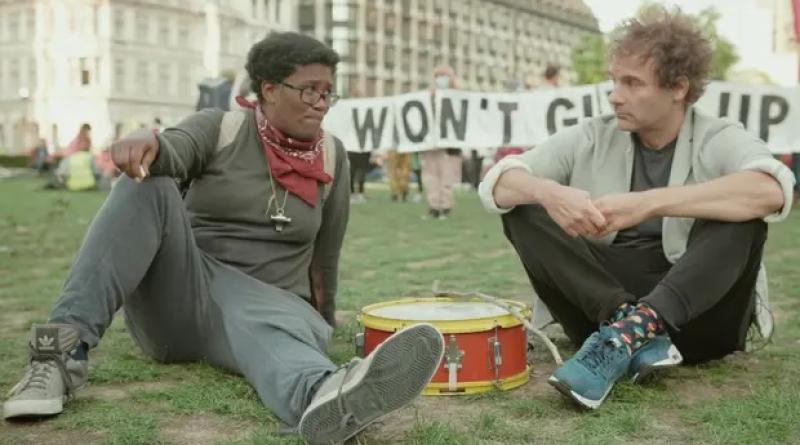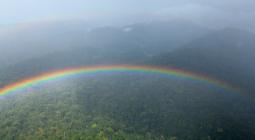We don’t have to be overwhelmed by climate anxiety. Feel the pain, then act

It doesn’t matter which week we choose. There is always a climate emergency; an emergency we can close our ears and eyes to. Two weeks ago, it was the blanketing of New York in a cloud of smoke from Canada. Last week, Beijing recorded the hottest June since records began. All over the world, sea levels rise. Drought or flooding ensues. And the loss of habitats and species. We can get frightened and find it hard to hold the knowledge of what is occurring.
As filmmaker Josh Appignanesi shows in his new film My Extinction, which will be released on 30 June, allowing himself to feel the real-time effects of climate change is uncomfortable. Appignanesi, who recycles yet makes car commercials, turns the camera on himself as his climate concerns start to make him feel disgruntled. He feels put out and inconvenienced. And he ends up getting far more involved in climate work than he’d ever thought possible.
The implications of acknowledging the nefarious activities of the oil and logging companies, and the London hard-sell thinktanks that operate as fig leaves for their corporate power, can be enraging and curiously stultifying. Yet if we stay long enough with our feelings of rage, of helplessness, of sorrow, of wanting to shut off what we didn’t want to know about, we can find a way too towards a new ethics of responsibility.
Appignanesi’s film reminds us that working together is the empowering antidote. It’s a lesson we need to be reminded of again and again.
My working day as a psychotherapist involves engaging with conflicts, with confusions, with lassitude. Clarity and relief don’t come from intricate analysis on its own. Clarity and relief emerge out of an understanding of the difficult feelings generated by hurt, by abandonment, by aggression, by neglect, by carelessness and by unintentionality.
Along with understanding is the process of experiencing these often troubling emotions. Experiencing emotions is not an “aha” moment. Feelings are more devilish and complex. It’s as though we have to “un-repress” them so they can unfold through their many and varied dimensions.We might first notice rage, which then gives way to sadness, to despair and a new thoughtfulness about what to do. Or we might start with helplessness, which opens up into insult and then indignation. How feelings cascade is personal. They are rooted in the emotional palates we were exposed to growing up – the feelings our families sanctioned (and didn’t) and how we’ve been able to expand from those. In whichever way we now come at our feelings, what’s interesting is that, once allowed, supplementary feelings emerge.
Sticking around to see what those are enriches not just our own sense of self and potency but builds a bridge to doing. Adding our knowledge – the facts of a given situation – to our feelings combines to create new psychological landscapes that allow an individual, family or group to act differently in the present.
So, too, with climate issues and the sorrows and immobility that the catastrophic can at first induce in us. The involuntary turning away and acceptance that our world is doomed can sink us into despair. Thank goodness for the young and their refusal of futility. Their railing and actions set an example by reminding us that acknowledging our feelings can propel us to act. Shutting off from our feelings is a counsel of collapse; it diminishes us, it disempowers us, it makes us less smart and, in so doing, adds to the climate emergency.
Do we know what to do? Not exactly. Are the efforts being made by individuals who come together to force the climate emergency on to our and the government’s consciousness effective? Yes and no. Awareness is high, but action is interrupted by ideological currents that seep into us emotionally.
Climate deniers learned new tricks from their forefathers in the tobacco lobby to stain our minds. Tobacco companies no longer deny smoking is bad – that battle is lost. Instead, they instigate an emotional appeal about freedom, individual choice and desire.
And so, too, the climate deniers having lost the scientific fight, have chosen to fight on a different terrain. They also invoke individual choice, reformulating progress as personal freedom. It’s sold as part of growth – economic development brings the whole world wealth. It’s a strange sell, and yet a compelling one. It’s of a piece with bearing arms in the United States and everyone making their own destiny and wealth, being an individual who can think for her or himself.
Psychology is harnessed to a pseudo-behavioural economics to persuade us that personal liberty and growth is all, that the freedom to travel where we wish, to see the world as our playground, to see forest fires and coral death as part of the “natural” ecosystem are phenomena we shouldn’t worry too much about so long as we recycle.
Emotional appeal at this level isn’t just cynical; it is deadly. It needs to be resisted.
The young, growing up more emotionally literate and with greater knowledge about environmental stories, are the ones to take the lead and contest such abhorrent views of freedom and personal liberty as they work to find solutions to the climate crisis. They join those who love and respect the “natural” world and those of us who abhor the perverse agendas of growth that rape the earth.
Yes, it is true we don’t know what to do but we are endeavouring to learn together, fight and speak truth to power. Old slogans, I know, but no less valid for that. Feelings can make us humble and make us strong. There isn’t a contradiction, just different aspects of human subjectivity that can propel us to think and act.
cover photo:Film-maker Josh Appignanesi, right, in a still from his film My Extinction. Photograph: Publicity image





